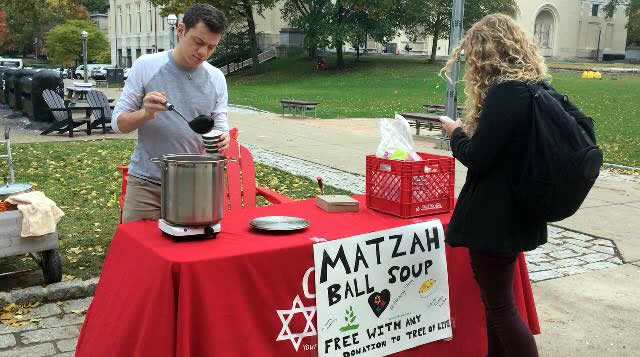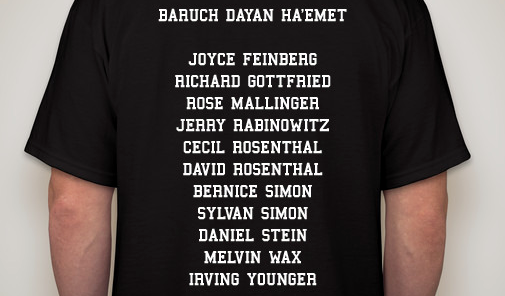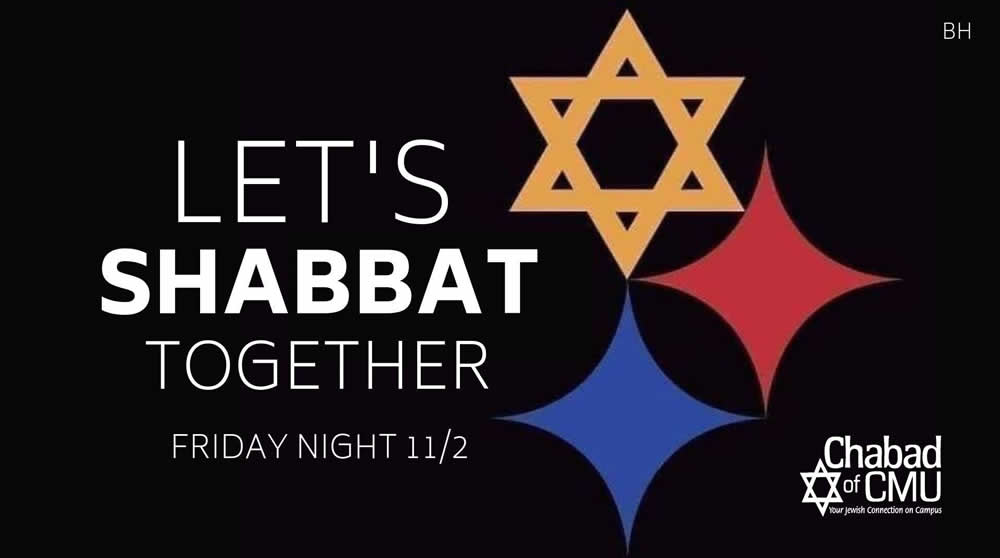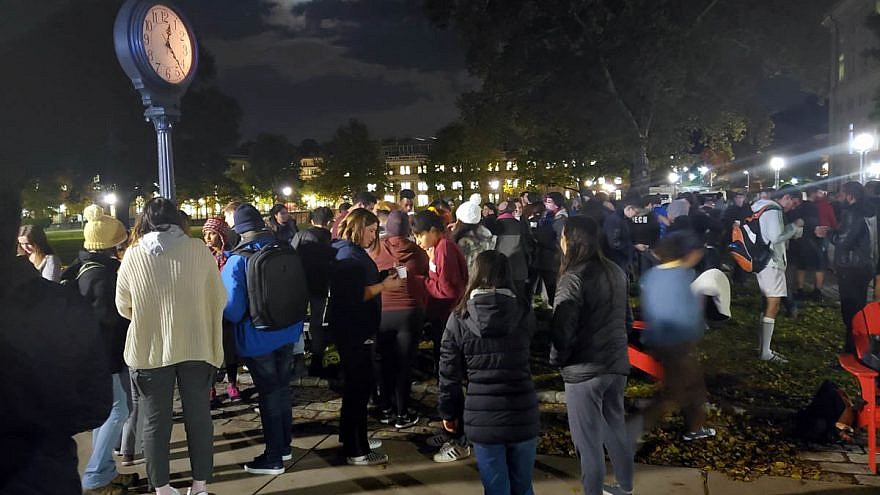Sheri-Rose Rubin was looking forward to visiting her daughter during Parents Weekend at the University of Pittsburgh. She, her husband Seth and their son Max had set off from their home in New Jersey to spend time with their freshman—walking around campus, watching a football game, learning how the semester was going over meals and time spent with Sophie.
But as they were preparing to leave their hotel last Saturday, they saw a television report that a shooting had taken place in a Squirrel Hill synagogue, and the suspect had not yet been caught. Pitt students were told to shelter in place, and so the three lingered in their hotel room until about 1 p.m., when they eventually set off to visit their daughter on campus a few miles away.
“There is that strange feeling,” describes Rubin, 51, a lawyer by trade who also teaches courses at Rutgers University, “that sense of being near something bad happening, though it’s not directly affecting you. The first thing we thought of was our own synagogue, envisioning our congregants there at the exact same time and wondering how they were feeling.”
They never made it to the game. They spent a quiet day together, admittedly checking their phones every five minutes, she says, after learning that 11 Jewish worshippers had been shot and killing during Shabbat-morning services at the Tree of Life*Or L’Simcha Synagogue.
“Everything seemed inappropriate,” she says, being so close to the situation and helpless to do anything. “I felt terrible that I was able to enjoy my Saturday while others were in the midst of tragedy.”
On Sunday, they left Pitt early to attend a community vigil that evening at their synagogue.
“It feels like a dagger in your heart,” says Rubin. “When you heard the names, all those Jewish names, they seemed so familiar. They’re your own people.”
With their parents back home, hundreds of Jewish students attending Pittsburgh-area colleges are facing the aftermath of a violent attack that has put their city on the 24-hour news cycle. The last of the funerals—of the oldest of the victims, 97-year-old Rose Mallinger—was scheduled on Friday.
Vigils, ad hoc fundraisers (selling items like soup and challah to raise money for victims’ families) and a mezuzah campaign have taken place all week, as students head into Shabbat.

Sara Weinstein, co-director of Chabad House on Campus-Pittsburgh with her husband, Rabbi Shmuel Weinstein, notes that last Saturday night, university administrators responded immediately, coming over the Chabad center to offer comfort and unity. Interfaith services have been held throughout the week for students from multiple schools, including the University of Pittsburgh, Carnegie Mellon University, Duquesne University and Chatham University. Area-wide Shabbat dinners are in the works; Chabad at Pitt is expecting as many as 500 students.
“It’s a time to be together—to stand strong and show our Jewish pride,” says Weinstein, who has served students at Pitt for more than 30 years. “We wish there were different circumstances, but we must use this time to act and be there for each other.”
She notes the enormous impact on the tight-knit community, which, like every Shabbat, will congregate in synagogues throughout the city.
“We are encouraging people to be together, to go everywhere on Friday and Saturday, to increase in acts of goodness and kindness. We are grieving—this was 11 whole worlds—but hatred only strengthens our resolve; it will increase our Jewish activity,” affirms Weinstein.
‘A staple of campus life’
Matt Berger, vice president of communications at Hillel, says Hillels around the country have opened their doors even wider, offering emotional support to help students process what has been called the worst attack on Jews in the history of the United States.
He adds that more than 100 vigils have taken place this week on campuses around the country.
But Berger says dealing with difficult situations, even trauma, is something Hillel has prepared for: “We are aware of anti-Semitism on campus, and of campus security and safety.”

According to Hillel, approximately 1,600 Jewish undergraduates attend the University of Pittsburgh (Pitt), representing about 8.5 percent of the undergraduate student population. About 400 Jewish undergraduate students, about 6.5 percent of the total student population, are enrolled at Carnegie Mellon University (CMU). And an estimated 600 Jewish graduate students attend CMU, Pitt and Duquesne University combined.
“Our goal,” stresses Berger, “is to build strong Jewish communities—to be a staple of campus life. We recognize that for many students, it’s their first time away from home for an extended period of time, and we aim to support them with whatever they need.”
Daniel Marcus, executive director of Hillel JUC (Jewish University Center) in Pittsburgh, elaborated specifically on those needs in the aftermath of the Oct. 27 shooting.
First, “all of our staff is on hand to provide love, care and support. Dozens and dozens of students have walked through our doors this week. We’ve offered a place to talk, have a hot drink, eat doughnuts. United Hatzalah has even come to talk to students.”

Second, he says, is an emphasis on getting together this Shabbat, after their weekly Thursday event, Challah for Hunger, that had students baking and using funds from the sales to go to the Tree of Life Synagogue. (Each week, they donate to a charity.) Students raised $4,000. Therapy pets are also coming this Shabbat—something that was pre-planned, but through social media, more students have expressed interest in spending time with the animals. Dogs, cats and rabbits will be on hand.
And third, notes Marcus, the “Hillel Makes a Difference” annual event, which was also planned before the shooting, takes place on Sunday, from 10 a.m. to 1 p.m. Students will volunteer to make blankets, visit homes for the aged, help with urban gardening and other concrete activities to benefit the community. He says that participation has increased all week.
Jewish students at CMU also held a fundraiser this week, selling matzah-ball soup and collecting more than $700 for victims’ families, according to Rabbi Shlomo Silverman, who co-directs Chabad of Carnegie Mellon University with his wife, Chani.
There was a large gathering the night of the shooting for Havdalah, he says, and as many as 2,500 participated in a vigil on Monday night, but now, shivah has started following the funerals. Chabad CMU is sponsoring a Shabbat dinner that the rabbi hopes “will be a springboard for people who want to connect with the community.”
He also notes that counselors are available for students, as they are at other universities.
But he is also looking forward. He is already organizing more events than usual for Hanukkah—additional menorah-lightings, traditional foods, speakers. He wants students to stay connected, and says that eventually, the mourning should turn into something else—positive action.
“It’s really the message of Hanukkah,” says Silverman. “Doing for others, performing acts of kindness … bringing light to the darkness.”

























